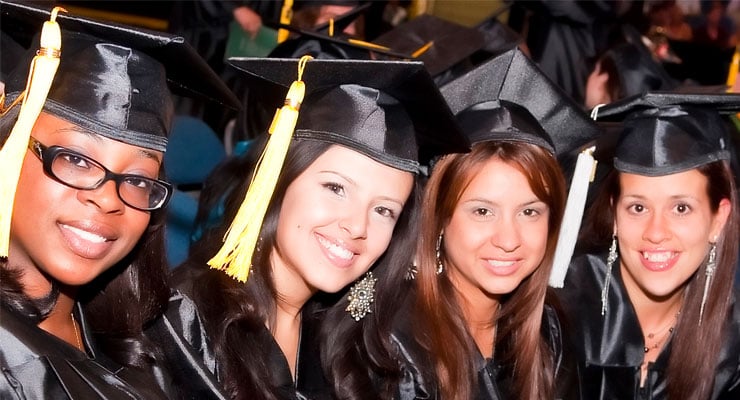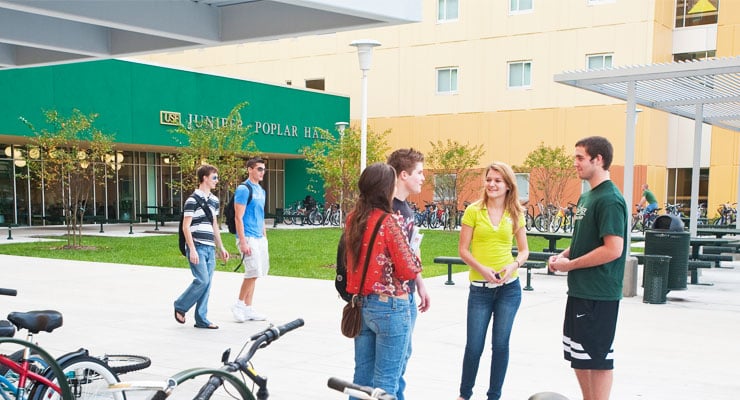
Defining why a college education is important involves more than just identifying the superficial benefits of more career opportunities. At a deeper level, college is where you will map a path through life that can take you to places you never expected to go.
The beauty of postsecondary education is that college can yield tangible and intangible benefits for you that in turn benefit others – even if school doesn’t awaken your sleeping Pablo Picasso, Stephen Hawking, or Bill Gates.
Tangible Benefits of a College Education
It’s well established that a college education delivers measurable material benefits. If you were to rattle off the list of reasons you’re attending school, chances are these are the first ones you’ll mention.
College Education and Wages
A handful of money definitely qualifies as a tangible benefit, and research has matched levels of education to payroll expectations and the ability to find a job:
- In 2015, bachelor’s degree holders earned 64 percent more than those with a high school diploma.
- Bachelor’s degree recipients can expect to earn about $1 million more over a lifetime than a person who doesn’t go to college.
- A postsecondary education is expected to be required for about two-thirds of available jobs by 2020.
A recent study broke the higher education benefits down even further, finding among other things, that a bachelor’s degree now means the holder will earn 84 percent more than someone with no postsecondary education. The report went even further, projecting lifetime earnings based on virtually all education levels:
- Lifetime wages of a high school dropout – $973,000
- Lifetime wages of a high school graduate – $1.3 million
- Lifetime wages of someone with some college but no degree – $1.5 million
- Lifetime wages of an associate degree holder – $1.7 million
- Lifetime wages of a bachelor’s degree holder – $2.3 million
- Lifetime wages of a master’s degree holder – $2.7 million
- Lifetime wages of a person with a doctorate – $3.3 million
- Lifetime wages of a professional degree holder –$3.6 million
Based on U.S. Census Bureau data, the usual median weekly earnings in 2017 for people of varying education levels was:
- Doctoral degree holder’s median weekly earnings – $1,743
- Professional degree holder’s median weekly earnings – $1,836
- Master’s degree holder’s median weekly earnings – $1,401
- Bachelor’s degree holder’s median weekly earnings – $1,173
- Associate degree holder’s median weekly earnings – $836
- Person with some college (no degree) median weekly earnings – $774
- High school diploma (only) holder’s median weekly earnings – $712
- Person without high school diploma median weekly earnings – $520
The unemployment rates in 2017 for people in those education categories was 1.5 percent for doctoral degree holders, 1.5 percent for professional degree holders, 2.2 percent for master’s degree holders, 2.5 percent for bachelor’s degree holders, 3.4 percent for associate degree holders, 4 percent for people with some college, 4.6 percent for people with a high school diploma, and 6.5 percent for people without a high school diploma.
Better Jobs Equal Better Benefits, Perks
A college education also usually translates to great benefits and perks as well:
- Typical white-collar benefits: health insurance, eyecare insurance, vacation and other paid time off, dental insurance, maternity/paternity leave, pension plan, 401(k)
- Potential white-collar perks: transportation and parking reimbursement and/or company car, free food and beverages, flexible schedules and freedom to work from home (or elsewhere), concierge services, golden parachutes (high-dollar severance packages)
For Some, College Is the First Real Adventure
College takes you out of familiar surroundings and presents new challenges. But college doesn’t only pave the way for intangible experiences. Adapting to new faces in a fresh place is just the start. The education process can mean internships, overseas travel, exciting research opportunities, and exploration of multiple career paths, all of which can lead to some very tangible results when you start working.
And academic success opens doors to careers where, quite literally in some cases, even the sky and moon aren’t the limits. Think aerospace engineering.
Connections that Can Last a Lifetime
The thousands of people you meet, study with, and work alongside in college will range from peers to mentors, along with power players in your chosen field and others. These are connections you will make note of and potentially use to advance yourself and your ideas.
And as far as relationships go, the only romantic label as common as “high school sweetheart” is “college sweetheart.”

Intangible Benefits of a College Education
A college education can open doors for your career and your own personal growth. For example, college helps develop many important skills, such as self-awareness, global-mindedness, critical thinking, and more.
People by Nature Desire Knowledge
That is a paraphrase of a premise that the Greek philosopher Aristotle states in his Metaphysics. It is affirmed by the connection of head and heart when the study of history helps you forecast the future, when math adds up to real-life solutions, and when the development of skills allows you to produce a masterpiece worthy of the Library of Congress, Metropolitan Museum of Art, or U.S. Patent Office.
In Pursuit of Critical Thinking
Results are in on colleges and critical thinking. During one recent study, researchers began with the notion that everyone wants colleges to teach critical-thinking skills and that the challenge routinely is accepted. Here’s a key finding: Data show that a student who begins college with critical thinking skills in the 50th percentile can expect to be in the 72nd percentile after four years.
Critical thinking is, according to the Foundation for Critical Thinking, “that mode of thinking — about any subject, content, or problem — in which the thinker improves the quality of his or her thinking by skillfully analyzing, assessing, and reconstructing it.” Developing that skill yields endless opportunities to enrich your life both personally and professionally.
College Advances Self-Realization
A college education, if pursued honestly and earnestly, gives you the knowledge and skills needed to pursue a career and your passions. The degree also can bring hard-to-match personal satisfaction. A huge part of ensuring that self-realization process is finding a school that is right for you, where you’ll feel safe and comfortable enough to let yourself grow and explore.
Our USF admissions advisors are happy to answer your questions about the USF admissions process, so contact us online or by phone at 813-974-3350.


